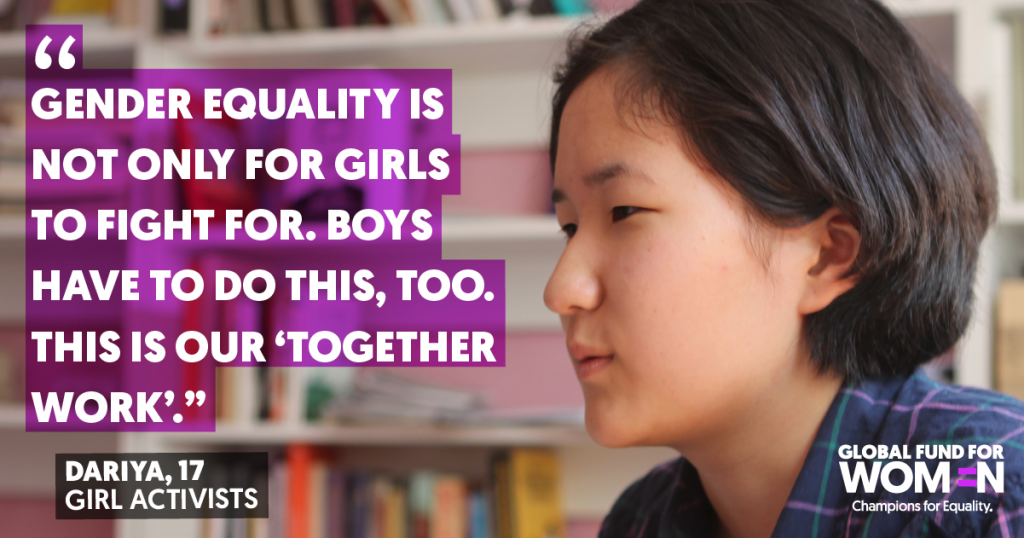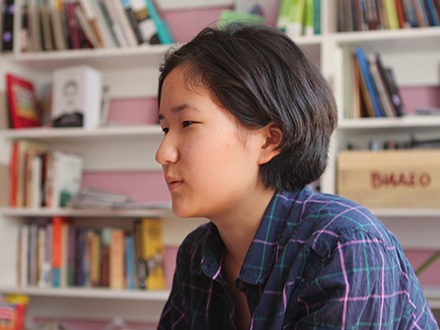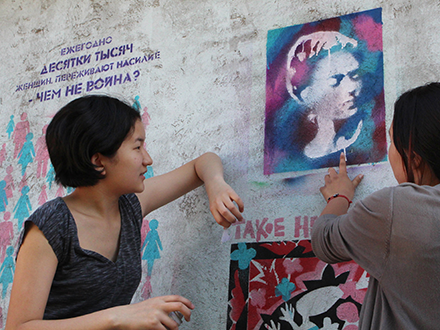Dariya is a 17-year-old activist in Kyrgyzstan, standing up for girls’ rights with arts and humor. She shares her story about creating Girl Activists of Kyrgyzstan through Bishkek Feminist Initiatives, a recent Global Fund for Women grantee partner that helps to foster the creation of young women’s groups and empower young women’s activism and leadership. Girl Activists focuses on empowering girls through art, workshops, music, technology, and more to understand their rights, end gender-based violence, and speak out against damaging cultural norms around gender inequality. (Story as told to Paola Gianturco in Wonder Girls: Changing Our World published by powerHouse Books, 2017.)
At the very beginning, I attended a camp right here, organized by the Bishkek Feminist Initiatives. I thought it would be very boring since most of our camps are USSR style. My brother, 23, also an activist, told me, ‘Just go and see; you can leave the next day if you want.’
First day, it was a little like school. Lectures about my reproductive health and girls’ rights. But I started understanding many things. For example, I didn’t notice before that I have gender inequality at school. That people think a girl is a “thing”—a thing that cleans house, does whatever she is told.
We created a small group to meet each week and discuss. After that, we did our logo, our website, Facebook and Twitter, and we made this happen. We felt support from the Bishkek Feminist Initiatives, and from my mother and brother. We had 24 members.
Parents of the village girls said, ‘What’s this? You mustn’t know about reproductive health.’ Here, we have the culture of shame. It’s a shame to know your body. You have to be a virgin when you are married or you are defective. Those parents no longer let their daughters come to Bishkek. It was a very hard period when nobody was coming. We felt our organization was breaking…
We decided we didn’t want to be an organization with all the documents and official things. We decided to be more of an arts group, creative girls doing things we know how to do and want to do. After we realized that, our group became more powerful.
We had posted serious stories about girls, using facts and statistics. Then we realized that only adults were reading. We wanted to change minds of other teenagers so our generation will be more tolerant and stand in solidarity.
We thought: we are teenagers; what do we like? Now we are going to make a funny site that laughs at stereotypes, patriarchy, and inequality. We want to make jokes, like, about xenophobia. Videos. Comics.
There are some funny things. My cousin was kidnapped. She was a basketball player. Big. Strong. When she was kidnapped, three guys tried to force her to come with them. She was so so so angry that she fought with them all. They were like, ‘Oh my God, we don’t want her!’
Now, Girl Activists has four coordinators. Other girls come and hang out with us. Once a month we screen movies that focus on girls’ rights. Tomorrow, Swedish artists are coming to teach 25 of us to draw cartoons of superheroes.
We have an idea to change schoolbooks for math, geography, biology, and other subjects. I do not see even one woman scientist. The books say ‘he,’ not ‘she,’ even if you are reading about a girl. We want to take a schoolbook and make it into handmade art. There will be corrections, marginal notes, stickers, new pictures. Maybe we will give our book to the Minister of Education. We will say, ‘You must make books gender sensitive. Here are our recommendations for all the schoolbooks.’
On International Girls’ Day, I attended a conference in Almaty, Kazakhstan, about reproductive health and violence against girls. When I stood to speak I said, ‘Look around. Whom do you see? There is only me, one girl at a conference about girls.’ There was silence. Then one woman said, ‘We are adult girls.’ They cannot feel the problems of girls, experience what girls experience, if they are not girls.
We think ‘girls,’ the word, means ‘up to 18 years old.’ In the beginning of our blog, Our Stories, Ourselves, we asked coordinators from the villages to collect stories from their friends and classmates. When girls tell their stories, it’s the truth and it’s powerful.




